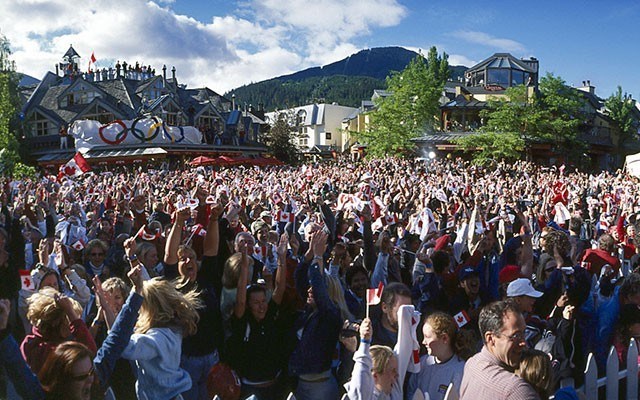Ask a long-term Whistler local about their memories of the 2010 Winter Olympics, and you might notice their voice turn wistful and their eyes get starry.
They might talk about the surreal feeling of volunteering or working during events, how it felt to walk down a packed Village Stroll and soak up the electric atmosphere, or the pride of cheering on hometown athletes in person. About the way everyone came together to show off Whistler in its best light and to welcome the world for a truly epic, two-week-long party.
The word I hear most often associated with Whistler in February 2010 is “magic.”
There were people in town who had a bad time, I’m sure. I just haven’t encountered many of them. Even the slightly more cynical seem to have good memories of empty ski runs—“hardly anyone was on the mountain, it was crazy"—or the hecticness of sleeping on a friend’s couch and slinging drinks non-stop for more than two weeks straight in exchange for buckets full of tips.
I, on the receiving end of these stories, always feel a tiny sting of bitterness that I wasn’t in Whistler living that once-in-a-lifetime-experience firsthand.
I was still in high school in Ontario in 2010, watching events through a TV screen. All the gold medals and memorable moments—gold-medal goals, more specifically—still carried a sense of magic from three time zones away. But every time cameras panned over a crowd, I remember dreaming about how much more fun it would be to take it all in in person.
But witnessing an Olympic Games in Whistler might not be a once-in-a-lifetime experience after all.
As Whistler prepares to cheer on more than a few locals when they compete in Beijing in February (gonna take this opportunity to plug Pique’s upcoming Olympic coverage— stay tuned for lots of athlete profiles and daily blogs!)—many Olympic proponents already have their sights set on 2030.
Last month, the Lil’wat, Squamish, Musqueam and Tsleil-Waututh First Nations, along with the Resort Municipality of Whistler and the City of Vancouver, announced plans to “explore the feasibility of an Indigenous-led Olympic Games” in 12 years.
The idea is to re-use venues from 2010 and host a leaner, greener version of the Games. Vancouver 2010 CEO John Furlong recently claimed neither new venue construction nor government funding (outside of a costly federal security commitment) would be necessary to host the Games for a second time.
It sounds like an exciting prospect, but not all British Columbians are on board.
A Leger poll of more than 1,000 B.C. adults conducted for the Vancouver Sun last month found residents were split in their support for the Games. It registered overall support for the 2030 Olympics at 34 per cent, while 31 per cent of residents said they are neutral and 35 per cent oppose the bid.
A survey we ran on Pique’s website two months ago, meanwhile, asked readers whether they’d support a Vancouver/Whistler 2030 Olympic bid. With 49 per cent of the vote, “Yes” barely won out over two other options.
Count me in the yes camp.
It’s difficult to argue that the Games didn’t have a positive lasting effect on Whistler's community. There’s much-needed employee housing in Cheakamus, a safer highway and the kind of recreation facilities that only exist in a handful of regions around the world. It boosted Whistler’s profile and similarly boosted the resort’s visitor numbers and economy. More than a handful of local athletes heading to Beijing might not be in that position if it weren’t for the legacies left by the 2010 Games.
That said, Whistler is in a far different position now than it was 12 years ago. An elevated profile might be low on the list of things this community needs, but things like housing and improved transit options aren’t. Who’s to say we couldn’t leverage a bid in a way that sees the Sea to Sky corridor reap even more benefits out of the world’s biggest sporting event, two decades later?
It’s also worth noting that Whistler was purpose-built for this event. If it weren’t for a small group with an idea to create an Olympic venue in the ’60s—and then the construction of a pedestrian village to support another bid in 1976—who’s to say Whistler as we know it would even exist today?
Valid arguments exist about the Olympics’ economic and environmental costs, as well as the Games’ relevancy in the future—assuming they’re held in a similar way to how they’ve been held the last few decades.
Ultimately, I think countries putting their differences aside to come together for something as positive as sport has more pros than cons. With First Nations in charge, I also think this could serve as an opportunity for B.C., and Whistler, to show how hosting a major sporting event can be done as responsibly as possible, and hopefully usher in a new era for the Olympics.
Realistically, we’d need to beat Sapporo anyways. So let the Games begin.






